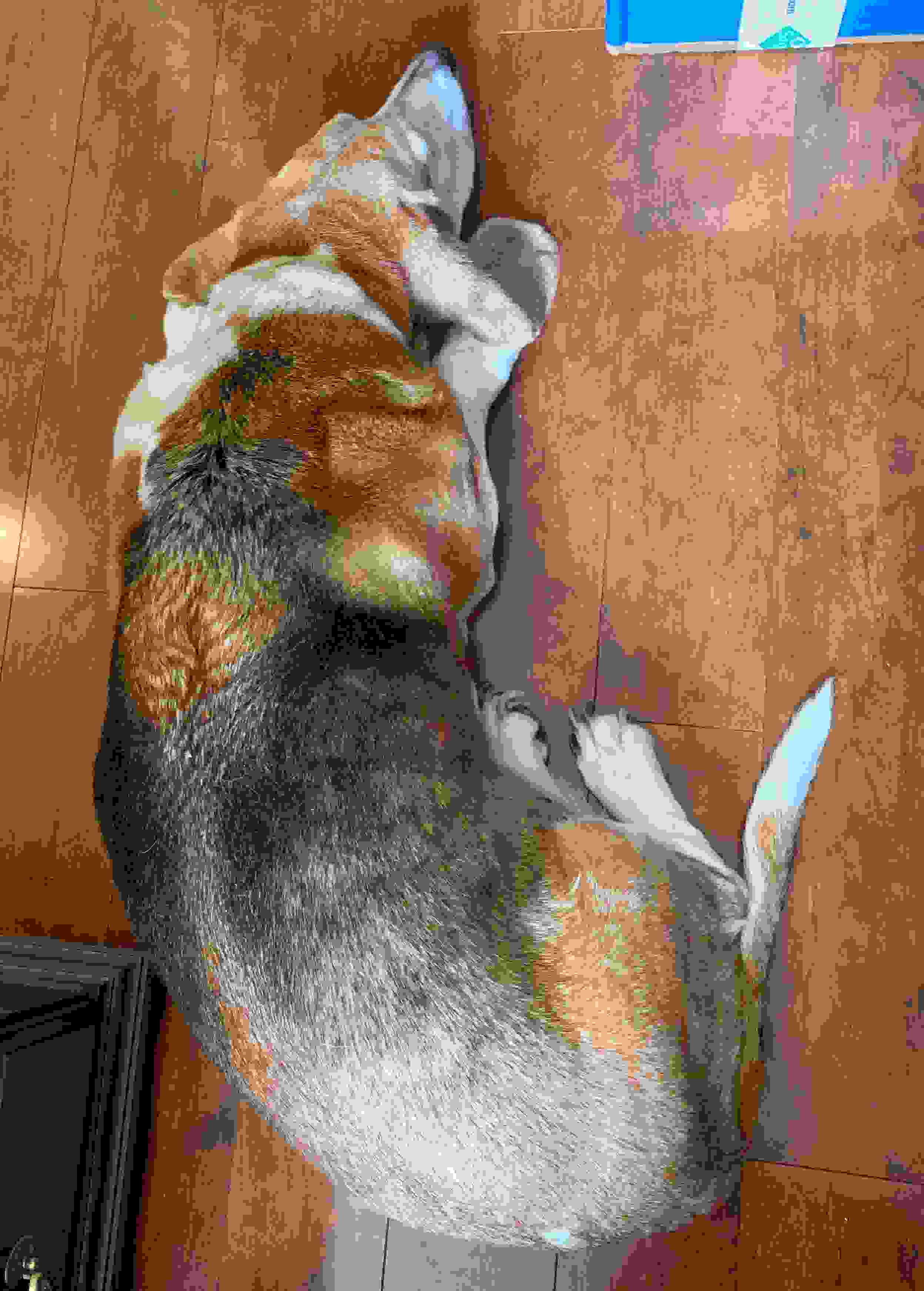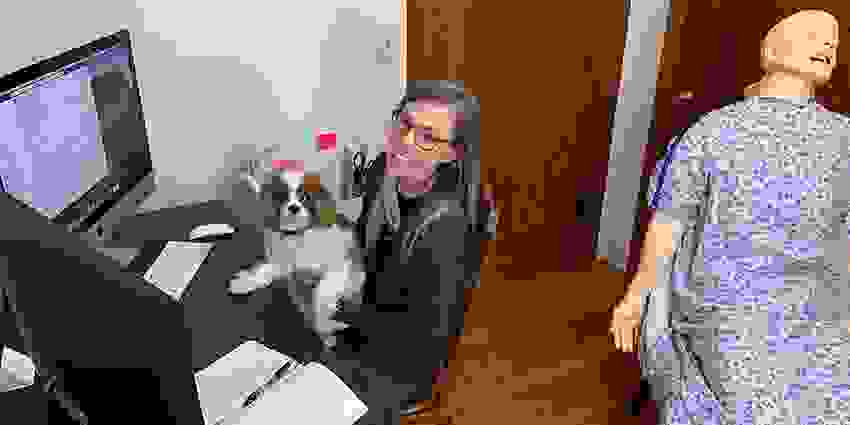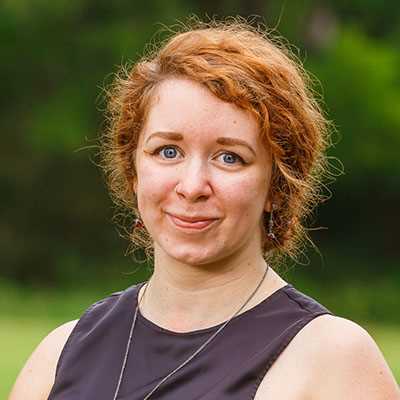Cattle, cooking and community: TWRI works from home
In March, in the face of the COVID-19 pandemic, Texas Water Resources Institute (TWRI) staff shifted to working remotely, sheltering in place with their families and roommates.
As TWRI staff members have adjusted to this temporary new normal, they’ve found new ways to work and stay connected. Bedrooms, kitchen counters and patios have become office spaces, using whatever is available.
The new office spaces often come with new office mates. Grant administrator Danielle Kalisek’s son is sometimes on school video conferences or listening to drawing and origami tutorials on the bed behind her desk while she works, and research assistant Anna Gitter’s cat vies for the warmth of her laptop. Jaclyn Robertson, program assistant, shares an office with the 6-foot-tall, blinking, breathing medical simulation mannequin that her husband had to bring home in order to work remotely. Occasionally, the cattle that Jaclyn’s grandfather runs on the land around her house can be heard on video calls.
Michael Schramm, TWRI research specialist, moved into a 70-year-old house in December, and with renovations still underway, there’s no established office space yet.
“My spouse and I trade off working at the dining room table and the converted garage space. It also means our two-year-old has free reign to our workspaces,” he said.
With roommates or families at home together, creating an established routine has been particularly important, many TWRI staff members said. Those with children wake up early to get in some work before the rest of the house is awake, and lunch hours are spent helping children with schoolwork.

If routine is important, so are patience and flexibility when routines don’t go as planned, said Dr. Rosario Sanchez, senior research scientist.
“Murphy’s Law is in full effect,” Jaclyn said. “We’re certainly building resilience.”
When Dr. Lucas Gregory, senior research scientist, called research associate Ed Rhodes with a work question, Ed’s two-year-old was in the middle of a tantrum.
“Lucas just laughed and said, ‘Good luck!’” Ed said. “But for the most part, things have gone pretty well.”



“It’s more of a balancing act now than it has ever been, but I feel we are all closer and talking through things more,” Danielle said. “We’ve constantly been adapting and adjusting.”
Work hasn’t slowed down, despite going remote. For many, work has shifted focus from in-person meetings and events to report writing, data analysis and remote events.

TWRI director Dr. John Tracy said the shift has provided a valuable opportunity to expand TWRI’s technology use. Several urban riparian training events have already occurred online, and more remote educational events and stakeholder meetings are upcoming.
“We’ve received positive feedback about the content and ease of learning,” Nathan Glavy, extension program specialist, said of the online trainings. “What has helped for sure is making all educational content readily available online prior to our workshops so attendees can follow along.”
Under Governor Abbott’s Executive Order GA-14, government entities are allowed to continue providing essential services. As Texas A&M AgriLife Research views research as an essential operation, some field work has continued, albeit with adjustments.
“We’re keeping personnel safety at the forefront,” Lucas said. When he and Ed went out to collect data recently, they used multiple vehicles to maintain social distancing. Different tasks and equipment are assigned to different people, so no one is handling the same tools, and all tools are cleaned thoroughly.
Still, research assistant Stephanie deVilleneuve said, “It is a strange feeling having to be cautious of one another when you are out in the field and usually work closely together.”
John said mass working from home has its upsides though. He’s been making bread over a few 10-minute breaks throughout the day, with the bread rising and baking while he works. Extension associate Victor Gutierrez has been experimenting with new sauces and spices in his cooking, while Michael has been preparing “healthier and yummier” bento box-style lunches that remind him of the ones his mother used to make.
Working remotely also means there’s more quality family time, said Sarah Richardson, communications specialist. “Throughout the day, we take advantage of the immediate outdoors with breaks from school assignments and work to safely enjoy the outdoors together on a walk or in the backyard pool,” she said.




Danielle agreed. “It’s a treat getting to see kids throughout the day and getting the random hugs as well as random and entertaining questions and sayings,” she said.
Many TWRI staff said getting outside has helped with maintaining a sense of normalcy. After work, Victor bikes on the trail behind his house, and communications manager Kerry Halladay looks for lizards in her backyard and works on building a shed. Michael takes walks around the neighborhood with his two-year-old daughter and finds that he usually returns “with a clear and refreshed mind.”
“I value my time spent outdoors even more,” Anna said. “I appreciate it so much more now when other runners or walkers wave at me and say hi. I used to take that for granted, but now it shows a sense of community.”
Many TWRI staff members said maintaining that sense of community has never been more important, now that it’s not possible to just pop into people’s offices to ask a quick question. Lucas has been remedying that by doing spontaneous video calls with other staff members, both to ask work questions and just to check in.
“I’m a card-carrying introvert,” Lucas said. “But over-communicating is better right now. Don’t be shy about intentionally reaching out to people.”
These uncertain times have a way of clarifying what’s important, he said.
“All the unnecessary things get cut. We’ve boiled down to the most important things only. We’re forced to stop and smell the roses and appreciate what we have and can do,” he said. “Hopefully we’ll all come out of this having grown.”
After all, we’re in this together, Danielle said.
There will be more educational events and stakeholder meetings held from kitchen tables and bedroom desks with children and dogs peeking in. Research will continue, and communities will keep coming together, even remotely. TWRI’s support for Texans and water resources won’t falter.

Explore this Issue
Authors
As a communications specialist for Texas Water Resources Institute, Chantal Cough-Schulze worked with the institute’s communications team writing articles for and editing txH2O magazine and TWRI's news section, developing TWRI multimedia materials and editing reports and education and outreach materials. She also served as the managing editor for the Texas Water Journal.



